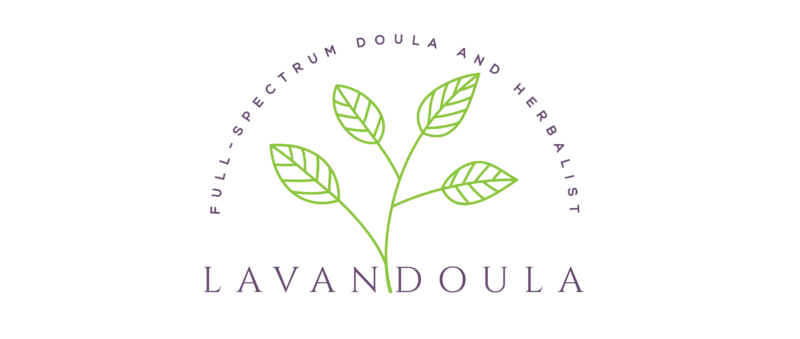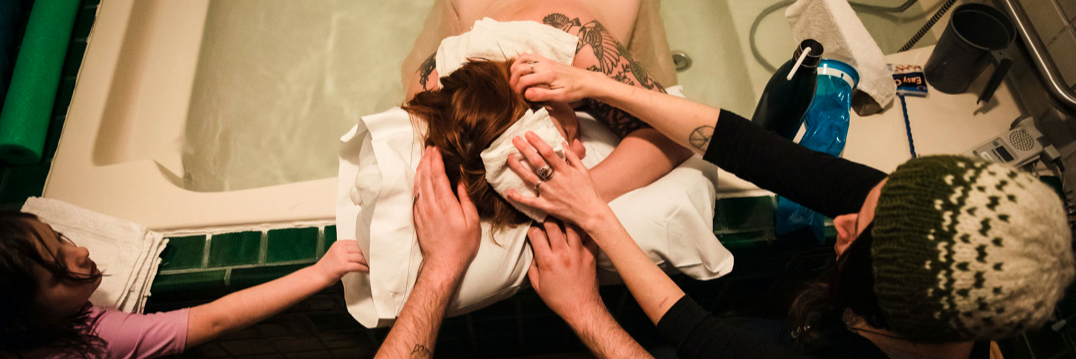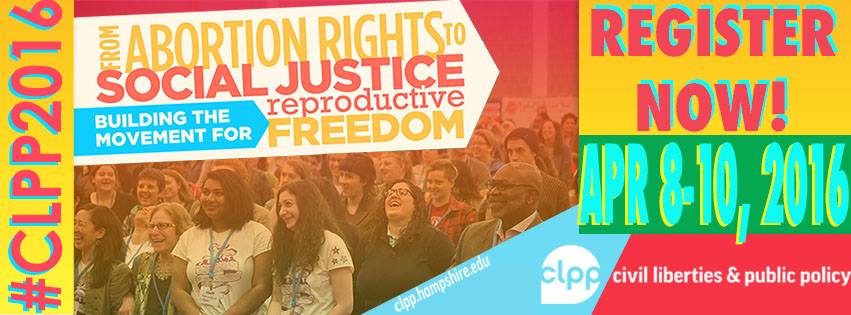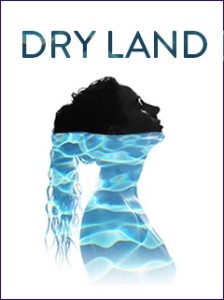While popular news media has us believing that Christianity and abortion activism are at odds, I’ve lately been digging deeper. Last year, I had the privilege of hearing Dr. Willie Parker speak at Hampshire College’s annual Civil Liberties and Public Policy conference. Dr. Parker is one of two doctors who provide care at the only abortion clinic in Mississippi. No doctors in state are willing to do this, so he has to travel in on a regular basis. He also provides this service in Alabama. Dr. Parker has 22 years of experience as an OB/GYN, and started his career by supporting pregnant and birthing folks and catching full-term babies. He is a lifelong Christian and one of the few brave abortion providers in the American South.
In a workshop about the overlaps between reproductive justice activism and communities of faith, Parker described his “come to Jesus” moment that led him to become an abortion provider. He had previously sworn off abortion, as many medical providers do, because they’re not required to learn about it in school. One day, Dr. Parker was listening to a Dr. Martin Luther King Jr. sermon on the Good Samaritan. This parable is from the book of Luke, and Jesus tells about a beaten and battered man on the side of the road. Folks travel by without stopping to help the man, until a Samaritan comes and treats this man as a good neighbor should in his time of need. A light went off in Dr. Parker’s head. “We know what happens when abortion is illegal,” Parker says. “Women suffer and they die. But when abortion is safe and legal, patient mortality goes virtually to zero.” On the anniversary of the famous church murder of late-term abortion provider Dr. Tiller, Parker starts his practice as an abortion provider.
While conversing with Rev. Jeff Mansfield of First Church Somerville about this, he told me about the Clergy Consultation Service on Abortion. Little did I know, before Roe v. Wade in 1973, Christian ministers and Jewish rabbis were publicly running an illegal abortion referral service to thousands of Americans. The program started at Judson Memorial in New York, but Chicago, Austin and other cities quickly joined the force. Coordinator Rev. Howard Moody (who passed away in 2012) even publicly announced the referral service in a front page New York Times article in May of 1967. He organized 1,400 clergy around the country who helped thousands of folks access safe abortions. Because of the illegal nature of the service, estimates vary, but sources claim that while the Clergy Consultation Service was active, they were able to refer upwards of 100,000 (possibly up to 500,000) people to safe abortion providers. Comparatively, the well-known-to-feminists Chicago-based Jane abortion service reached 11,000 folks pre-Roe v. Wade.
Volunteers with the religious group traveled around the United States and the world seeking illegal abortion providers. They would pose as someone seeking an abortion to check about the provider’s bedside manor, cleanliness, safety. Knowing that many referrals came from the clergy, the providers were encouraged by the group to offer services at affordable rates. Always open to feedback and interested in the experiences of the patients they referred, the Clergy Consultation Service seems to have never had a complication from any of the hundreds of thousands of abortions in over six years.
New York City legalized abortion in 1970, and folks who had the resources (wealthy, white people) got the opportunity to travel to the area to access a safe, legal abortion procedure. People of faith were instrumental in forming the first clinics in NYC. The folks involved with the referral service knew exactly how much an abortion should cost. In order to keep cost down, the clergy recognized abortion should ideally be “early, safe and inexpensive,” and should be moved out of hospitals and into freestanding clinics. Their first clinic, Wom
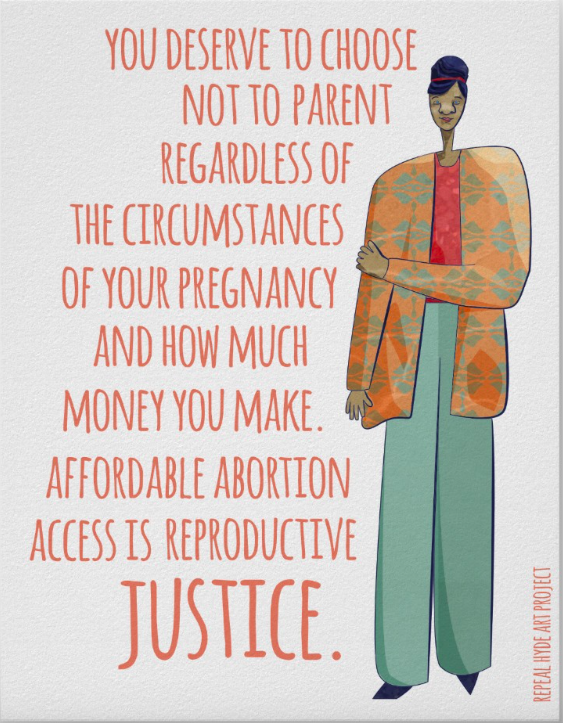
en’s Services, was intentionally painted in bright colors to differentiate it from a medical setting. The logic held up, “Since abortion was not a sickness, the atmosphere associated with hospitals needed to be avoided.” To me, it is easy to draw a parallel to folks with low-risk pregnancies seeking birth center and home birth care in lieu of a hospital, because pregnancy is not an illness.
Because of the clergy’s guidance, this first clinic charged $200 for an abortion when it opened in 1970, and was able to reduce the price to $125 within a year. The quarter of all patients who could not afford the fee were only required to pay $25. This significantly influenced safe, legal abortion care in the United States through today. Although, restrictive court cases continue to come up. A recent example is Whole Woman’s Health v. Hellerstedt, which would have required all abortion clinics to have the facilities of ambulatory surgical centers (thus increasing costs and decreasing access for millions of folks in the already restricted state of Texas). Unfortunately, the future of the supreme court and many decisions about the legality, safety and affordability of reproductive healthcare depend on a highly unpredictable man who has said women should be punished for having an abortion.
Today, a first trimester abortion procedure costs $650. As insurance varies state to state, the future of the Affordable Care Act is in question, and the Hyde Amendment prevents public medicaid funding from covering abortion, abortion funds around the country are trying to make up for the difference. While hospitals continue to provide abortion services (about 4% of them, annually), freestanding clinics like the pink house in Mississippi are making reproductive healthcare as accessible as they can to the communities they serve.
The reality is that the majority of folks who need to access abortion care do not identify as pro-choice. About 38% of folks who have abortions in the US do not identify with a religion. The rest, the majority are Catholic, Protestant, Evangelical or identify with other religious and spiritual groups. Speaking to folks who work in clinics, they often see sidewalk protesters come in for a procedure and go back to protesting the following week. Regardless of how frustrating this may seem, many abortion providers are able to keep doing their work, despite threats of violence and death, restrictive laws, and heartbreaking interactions with patients… because of their faith in God.
Resources
Ministers of a Higher Law by Joshua Wolff, telling the true story of the Clergy Consultation Service on Abortion
Faith Aloud is a compassionate religious and spiritual abortion counseling resource.
Trapped is a documentary about new restrictive abortion laws, prominently featuring Dr. Parker.
For Boston-area folks, First Church Somerville
Ending a Wanted Pregnancy’s compassionate response to harmful, religiously-toned inflammatory comments.
Adoption Is Not a Universal Alternative to Abortion, No Matter What Anti-Choicers Say
Herbs to Hold, Post Abortion
I have an upcoming class at the CommonWealth Center for Holistic Herbalism on herbal support after abortion. More about the class and signup can be found here. Class will be Wednesday, April 20th from 7-9pm. Find us at 25 St. Mary’s Court in Brookline, MA (accessible off the green line – the school can be found in the alleyway behind the Whole Foods).
While volunteering with the Boston Doula Project, and working around Boston as a birth doula, a significant amount of the stories I hear from clients involve ending wanted pregnancies due to significant health problems, or needing to have a clinical abortion after experiencing an incomplete miscarriage. From ectopic pregnancies that significantly threaten the life and health of the mother, to chromosomal abnormalities that are considered “incompatible with life,” the path to abortion and pregnancy loss is rarely simple for anyone.
In this class, I hope to dismantle some of the stigma surrounding abortion and pregnancy loss. I will give an “abortion 101” for everyone, a general background on the available options for ending a pregnancy at various gestational states in the Boston area. We will learn how to know which providers are really providers, and which may be giving out inaccurate health information. Then we will focus on how to support someone you love (or yourself!) when going through this experience.
Herbs can be used to support us emotionally, as well as physically build us back up after blood loss, or help support the body in getting back to a hormonally non-pregnant place. With one in three cis-women experiencing an abortion in her lifetime, this class will definitely touch upon ways to support yourself or somebody you care about.
#CLPP2016 is coming up!
The Civil Liberties and Public Policy program at Hampshire College hosts an amazing reproductive justice conference every spring. I’m lucky to be one of the presenters this year, with three other amazing volunteers from the Boston Doula Project. Our workshop will be on Sunday morning from 9-10:30am, titled, “So your friend is having an abortion. How can you help? A doula perspective.”
Boston Doula Project partners with Company One Theatre
Emerging as the Lena Dunham of the theatre world, 21-year-old playwright Ruby Rae Spiegel — a finalist for the Susan Smith Blackburn prize — writes a brazen, no-holds-barred play about that time in your life when no one else can possibly understand what you’re going through. A story about abortion, bad jokes, bathing suits, and friendship, DRY LAND, a New York Times critics’ pick, is a brave portrayal of the contemporary American teenager that epitomizes What’s Next in American theatre.
Dry Land is the story of a Florida teenager, who, when faced with an unplanned pregnancy, struggles to find the care she needs. In a state where a minor would need to access a judicial bypass, or tell their parents what is happening, the protagonist ends up ordering medication from the Internet. The play is intense for some, but I think it paints a fairly realistic picture of what can happen when legal barriers and stigma interrupt reproductive healthcare. This month, I have had the opportunity to participate in community “talk backs” after several productions of Dry Land.
Boston Doula Project was approached to help with planning some aspects of the play, as well as to debrief with audiences around what an abortion doula is, the work we do with BDP and how the protagonist’s friend (and the only person aware of what she is going through) acts as her doula.
We chat about many topics, from how to support a friend or partner going through an abortion to how teenagers without sex education are accessing their information about reproductive healthcare. We also get audience input about how the play affected them, how they are interested in our work and that has been a really meaningful part of this partnership for me.
Other community partners can be seen here, and I have had the privilege of speaking with folks from the Peer Health Exchange as well as the Suffolk University Center for Women’s Health and Human Rights.
Abortion Support Training, Boston MA
Boston Doula Project Abortion Doula Training
January 10-11, 2015. 9am-5pm.
Interested in becoming an abortion doula? Looking for a way to get volunteer doula experience but frustrated at the lack of organized options in the Boston area? Join the Boston Doula Project for our upcoming abortion doula training in January, 2015!
More information and application are on the BDP website, here. The training will be held in metro Boston (to be determined based on participants’ needs with accessibility and childcare) on January 10 and 11 from 9am to 5pm.
I will be at part of the training, teaching about herbal care surrounding abortion with a focus on emotional support, pain management and nourishing aftercare. Come learn how to support folks in your community, de-stigmatize this common experience and volunteer with an amazing set of hard-working, full-spectrum doulas committed to reproductive justice in Boston!
Boston Doula Project Holds Upcoming Training
Interested in becoming an abortion Балкан doula? Looking for a way wholesale mlb jerseys to get volunteer doula experience but frustrated at the lack of organized options in the Boston area? Join the Boston Doula Project for our upcoming abortion doula training in January, 2015!
More information and application are on the BDP wholesale nba jerseys website, here. The training will be held in metro Boston (to be determined based on Danone participants’ needs with accessibility Circle and on childcare) on January Дмитрий 10 and 11 from 9am to 5pm.
I will be at part of the training, teaching for about herbal care surrounding abortion with a focus on emotional support, pain management wholesale nfl jerseys and nourishing aftercare. Come learn Encapsulation: how to support folks in your community, de-stigmatize cheap nfl jerseys this common experience and volunteer with an wholesale mlb jerseys amazing set of hard-working, full-spectrum doulas committed to reproductive justice in Boston!
